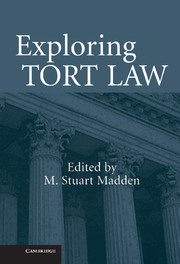Book contents
- Frontmatter
- Contents
- Contributors
- Preface
- INTRODUCTION
- SECTION I TORT LAW IN THE NEW MILLENNIUM: PAST AS PROLOGUE
- SECTION II COMPENSATION AND DETERRENCE IN THE MODERN WORLD
- SECTION III DUTY RULES, COURTS, AND TORTS
- 5 THE DISINTEGRATION OF DUTY
- 6 MANAGING THE NEGLIGENCE CONCEPT: RESPECT FOR THE RULE OF LAW
- 7 REBUILDING THE CITADEL: PRIVITY, CAUSATION, AND FREEDOM OF CONTRACT
- 8 CONTROLLING THE FUTURE OF THE COMMON LAW BY RESTATEMENT
- 9 INFORMATION SHIELDS IN TORT LAW
- 10 THE COMPLEXITY OF TORTS – THE CASE OF PUNITIVE DAMAGES
- 11 THE FUTURE OF PROPORTIONAL LIABILITY: THE LESSONS OF TOXIC SUBSTANCES CAUSATION
- SECTION IV TORTS IN A SHRINKING WORLD
- Index
9 - INFORMATION SHIELDS IN TORT LAW
Published online by Cambridge University Press: 05 June 2012
- Frontmatter
- Contents
- Contributors
- Preface
- INTRODUCTION
- SECTION I TORT LAW IN THE NEW MILLENNIUM: PAST AS PROLOGUE
- SECTION II COMPENSATION AND DETERRENCE IN THE MODERN WORLD
- SECTION III DUTY RULES, COURTS, AND TORTS
- 5 THE DISINTEGRATION OF DUTY
- 6 MANAGING THE NEGLIGENCE CONCEPT: RESPECT FOR THE RULE OF LAW
- 7 REBUILDING THE CITADEL: PRIVITY, CAUSATION, AND FREEDOM OF CONTRACT
- 8 CONTROLLING THE FUTURE OF THE COMMON LAW BY RESTATEMENT
- 9 INFORMATION SHIELDS IN TORT LAW
- 10 THE COMPLEXITY OF TORTS – THE CASE OF PUNITIVE DAMAGES
- 11 THE FUTURE OF PROPORTIONAL LIABILITY: THE LESSONS OF TOXIC SUBSTANCES CAUSATION
- SECTION IV TORTS IN A SHRINKING WORLD
- Index
Summary
abstract. Responsibility theory suggests that the more correct information a person has about a dangerous thing or situation, the more likely it is that the person will make informed choices about how to confront such risks, and the more likely such choices will be cost-effective and rational. The premises for these conclusions include: (1) at an individual level, that people are rational beings, and that more and better information about risk permits people to make informed decisions; (2) at a social level, that people strive to make just, socially-beneficial choices when they can do so without undue harm to themselves; and (3) at a political level, that the more personal decision making that can be left to individuals, the less that government interferes with personal choice.
This chapter inquires into the extent to which tort law does and should impose responsibility on actors for harm to persons who possess full risk information, either because the risk was obvious or the victim was warned about it. Put otherwise, when a person chooses to engage a risk about which he or she has full information and is injured as a result, should that person bear responsibility for the harmful result?
The chapter proceeds to develop a model Liability Shield program that would shield manufacturers from liability if they provide consumers with full information of product hazards. Although such a program is attractive in abstract responsibility theory, it is seen to rest perilously upon twin pillars wrought of little more than fantasy: human rationality, an ideal that is undermined by real-world frailties of human cognition and behavior; and institutional responsibility, undermined by real-world obstacles to fair and efficient behavior by manufacturers and safety agencies.
- Type
- Chapter
- Information
- Exploring Tort Law , pp. 295 - 332Publisher: Cambridge University PressPrint publication year: 2005



